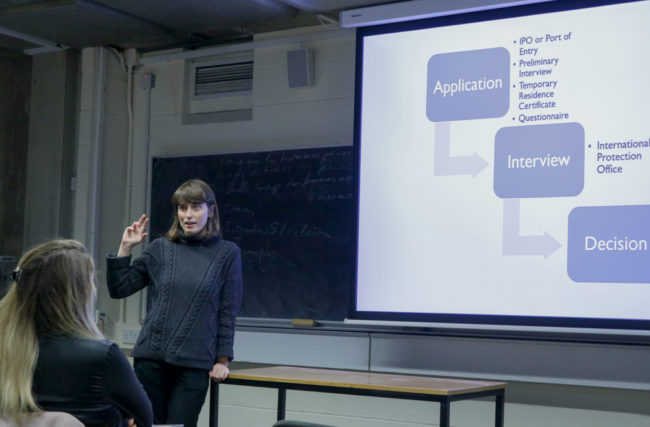
Last night, as part of Refugee Week, Dublin University Clinical Therapies Society (DUCTS) and Trinity Global Development Society hosted a talk by members of Spiritan Asylum Services Initiative (Spirasi). The talk focused on asylum seekers in Ireland and their medical care and social rehabilitation.
Spirasi is a humanitarian NGO that focuses on “helping survivors of torture who are asylum seekers, refugees, or other disadvantaged migrant groups”. Founded in 1999 under the trusteeship of the Spiritan Congregation, Spirasi aims to provide “medical therapeutic, social and educational assistance” to the refugees and thus facilitate their entry into civilian life in Ireland. It is funded by the UN and is the only organisation in Ireland that focuses on the survivors of torture.
The talk began with a particularly evocative video of a series of Dutch volunteers being hypnotised into believing they were Syrian refugees. Once they had undergone the process, they were introduced to the woman who had actually lived the experience they had experienced through hypnosis. It was certainly effective in humanising refugees and ensuring they existed beyond a series of statistics.
Paula Quirke, Spirasi’s Rehabilitation Coordinator, then gave an introduction to the lengthy application process for asylum seekers and described the ways in which the organisation aids refugees in their applications. She also explained that Spirasi has established various social clubs, including knitting, in order to facilitate social integration.
The focus on the individual was apparent throughout the talk. A doctor present gave several examples of the physical trauma of the patients that she had previously encountered as a GP, along with some insight into the situations they had come to Ireland to escape.
Her advice was very practical, covering everything from the use of interpreters to the symptoms of post-traumatic stress disorder (PTSD), which is very common among refugees. Since the audience was comprised of mainly students training to enter the medical field, this was especially useful.
The talk finished with another video that focused on the benefits of yoga for victims of trauma. Both speakers were engaging throughout and their passion for their work was evident. Their focus on practical advice ensured that the talk was useful for the students and this was reflected in the number of questions that followed.
Refugee Week continues on Friday with the #REDOUT event. Students are encouraged to wear red in protest at the treatment of refugees who have been living in Direct Provision, a supposedly temporary solution to accommodate asylum seekers in Ireland that has resulted in the denial of human rights to refugees.






